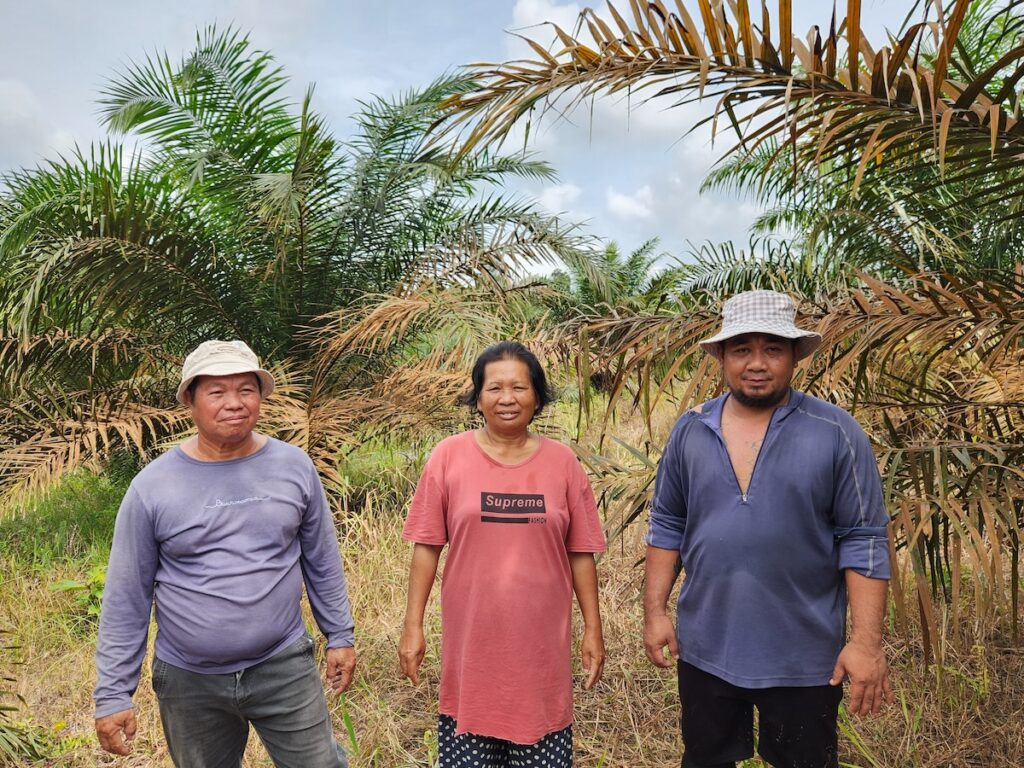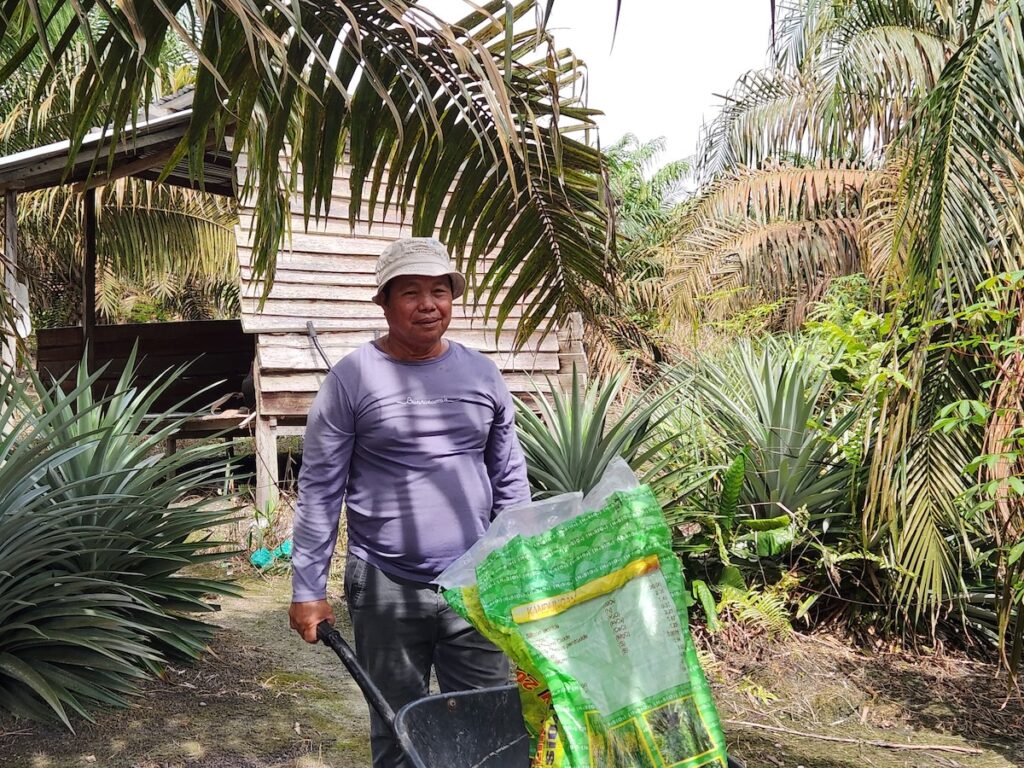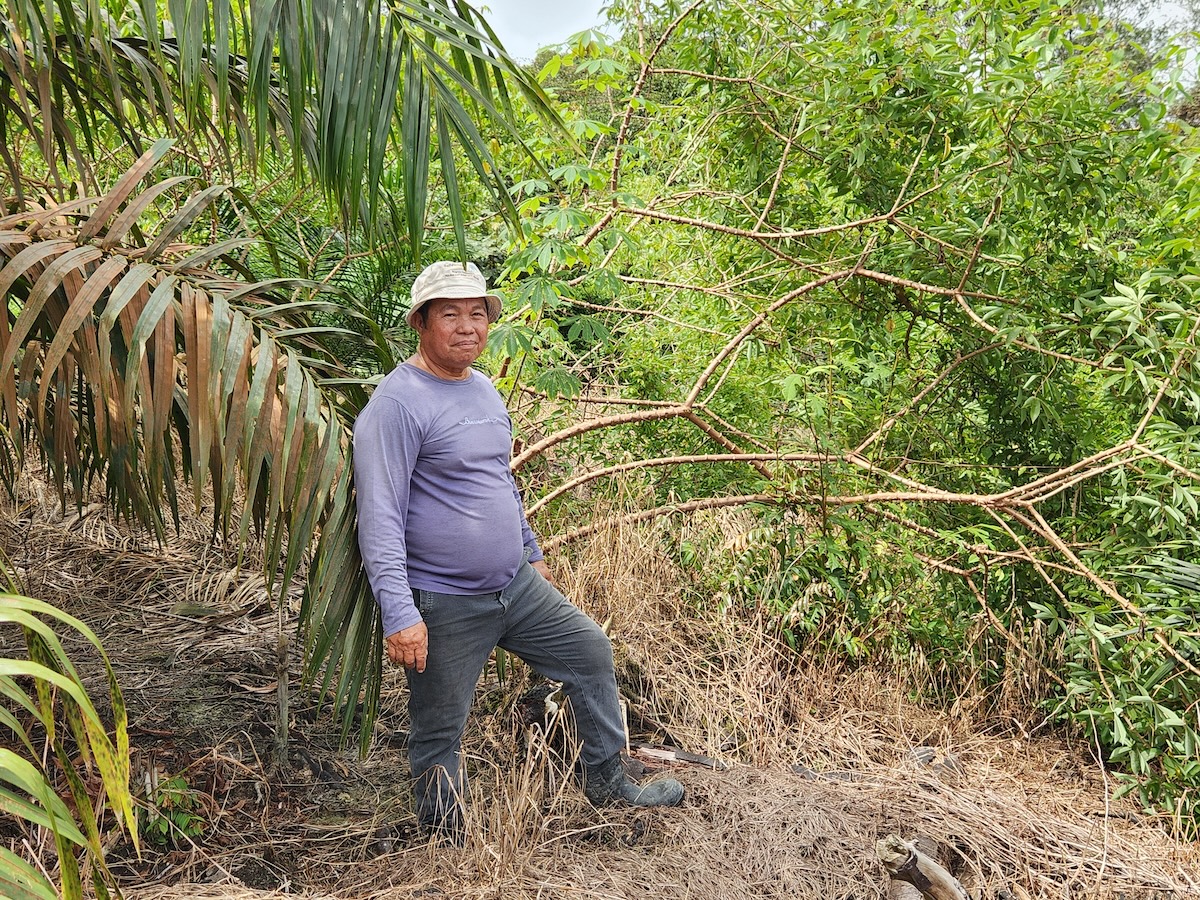After leaving his construction job in 2015, Henry converted the 4-hectares of land he had inherited from his parents into an oil palm plantation. He relied on the basics he had learned from his interactions with farmers.
“Our life has become so much better after I became a smallholder. I don’t have to worry about being able to provide enough food for my family, and I’m not bothered by household expenses any more,” says the 60-year-old.
Henry earns approximately MYR3,000 (627 euros) a month from his harvest. The earnings are sufficient to support the education of two of his four children (the other two are smallholder farmers like him). He also employs four local farm workers during the harvest period, offering them MYR60 (12.50 euros) a day and free meals.
Henry’s journey, however, was not always smooth sailing.

From Adversity to Triumph
During his first six years farming, Henry faced challenges in managing the farm’s health — pest outbreaks were the biggest threat. Then in 2021 he joined the Smallholder Support Programme (SSP), a part of the National Initiatives for Sustainable Climate-Smart Oil Palm Smallholders (NISCOPS) Project implemented by Solidaridad and the Malaysian Palm Oil Board (MPOB) in Sarawak. He intended to learn more about good agricultural practices (GAPs) and farm management methods, to overcome the issues he faced.
“I learned about biological pest-control methods and how to use insecticides optimally,” says Henry. “The lessons also taught me the importance of effective fertilization techniques, such as the 3R method (right time, right place, right amount) which has helped me increase my yield, mitigate climate risks, and enhance resilience.”

The training changed Henry’s perspective and practices. He tackles the threat of rhinoceros beetles that used to feed on his trees by manually collecting the beetles’ eggs from nests and carefully disposing of them. He also works hard to keep his farm tidy, getting rid of any rotten trunks that may serve as sources of beetle infestation. The improved pest-control methods have improved the monthly yield on his farm from 0.5 tonnes in 2021 to over 3 tonnes in 2024.
“I cannot read [fluently], so I record videos of the training sessions, especially the ones that demonstrate fertilization and harvesting techniques,” he says. By adopting the correct fertilization methods, he has not only been able to improve the yield on his farm, he is also improving the soil’s health and fertility.
Giving Back to the Community
In 2024, Henry and other smallholders in the region joined the Telagus Balai Ringin Smallholder Cooperative (KOPTEBARIS), a farmers’ cooperative whose members are participants in Solidaridad’s SSP programme.
The cooperative provides its 35 members with a platform to collectively engage in the cultivation and marketing of palm oil. KOPTEBARIS also works to coordinate field activities, pool resources, provide training, promote knowledge-sharing on sustainable practices and financial services, and establish market linkages for fair prices and marketing services.
The cooperative recently connected with fertilizer suppliers so smallholders in the area could buy fertilizers directly at a lower price. Solidaridad supports these activities, and provides technical assistance, training and advisory services for the members. Solidaridad also facilitates market development, sharing information on funding opportunities, and assists in monitoring and evaluation for continuous improvement. By helping the cooperative gain a firm foothold in the region, all farmers gain.
“I am very proud of what we have become. This cooperative helps scale up smallholders’ access to resources and knowledge, and improves their livelihoods.”
Henry Jelaman, oil palm smallholder and member of the KOPTEBARIS cooperative
Henry initially served as the Treasurer of KOPTEBARIS to manage the cooperative’s finances and ensure transparency. “I am very proud of what we have become,” he says. “This cooperative helps scale up smallholders’ access to resources and knowledge, and improves their livelihoods.” Although no longer holding the post, Henry continues to be an active member of the society, participating in every activity.
On the way back to his farm, Henry expresses his desire for a larger vehicle that’s better for transporting fresh fruit bunches (FFBs) to the dealers. Currently, he harvests around 4 times a month with each harvest generating a yield of around 800 kg. Since his car is so small, he has to make several trips to the dealers.
Henry is also worried about the frequency of heavy rains, which can wash away the fertilizer and limit nutrient absorption by the soil. Solidaridad experts have helped him and other smallholders learn when to halt fertilization application to avoid polluting water sources, and resume the activity when the conditions turn favorable.
With his enterprising nature, and the support he receives from Solidaridad programmes, is working hard to weather these adversities and build a more resilient future for his family.

